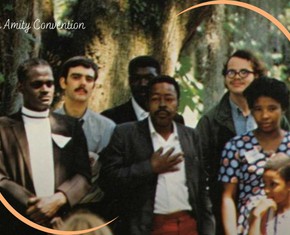The views expressed in our content reflect individual perspectives and do not represent the authoritative views of the Baha'i Faith.
In February of 2018, on a flight headed back to New York City from Bosch Baha’i School in California, I avoided sleep by pondering two different thoughts:
- Returning from a retreat for the Law Working Group of the Association for Baha’i Studies, I considered what contributions I could make to society’s most important discourses; and
- I contemplated the wonderful work my friend Margo Seibert does with her initiative “Racket,” to remove the taboo around menstruation and facilitate the distribution of menstrual hygiene products.
Ultimately, I made a connection between the two, inspired by the various Baha’i teachings concerning, menstruation, gender equality, and education.
I decided to submit a proposal for the then-upcoming Association for Baha’i Studies Conference, to discuss “Menstrual Inequity, the Advancement of Women, and the Revelation of Baha’u’llah.” Once it was accepted, I dedicated part of my summer to working with Céline Akhavan and Nadia Kardan to shed light on the importance of understanding menstrual inequity and its impact on society, and the significant contributions the Baha’i teachings can offer in this relatively new discourse.
If you’re not familiar with the term, menstrual equity, according to Jennifer Weiss-Wolf from the Brennan Center for Justice, comprises “the argument that the inability to afford or manage menstruation should not hold anyone back from educational opportunities or full societal participation.” The Baha’i teachings proclaim:
… until womankind reaches the same degree as man, until she enjoys the same arena of activity, extraordinary attainment for humanity will not be realized. – Abdu’l-Baha, The Promulgation of Universal Peace, p. 375.
Our current reality, unfortunately, means that women and girls face spiritual, health, financial, and educational disadvantages simply because they menstruate. They also face “period shame” in some cultures, which demeans their very existence and biological reality as females. But the problem of menstrual inequity does not only affect women – it prevents 51% of the world’s population from contributing their share to the overall progress of humanity:
Until the reality of equality between man and woman is fully established and attained, the highest social development of mankind is not possible. – Ibid., p. 76.
How does this happen? The United Nations Population Fund recently reported that:
… period shame and misinformation undermine the well-being of women and girls, making them vulnerable to gender discrimination, child marriage, exclusion, violence, poverty and untreated health problems.
The paper finds that menstruation taboos can keep women and girls from touching water or cooking, attending religious ceremonies, or engaging in community activities. These taboos reinforce gender-based discrimination, perpetuating the idea the menstruating women and girls are unclean. – Period shame, misinformation linked to serious human rights concerns
This stigmatizing of menstruation exacerbates the inequities that systemically impede the advancement and equality of women and girls around the world.
However – it becomes nearly impossible to effectively engage in dialogue to find solutions when so many people feel uncomfortable even using the word “menstruation.” How many of us resort to euphemisms, or avoid discussing the topic altogether? In order to change our attitudes toward menstruation, we need to understand it, and to understand it, we need to get comfortable talking about it openly and frankly.
In the Baha’i writings, Baha’u’llah broke away from the concept of ritual impurity that prevailed in past religions and was ascribed to women and their periods. In his Most Holy Book, Baha’u’llah wrote: “God hath … abolished the concept of “uncleanness”, whereby divers things and peoples have been held to be impure.” – p. 212. An explanatory note goes on to say:
In some earlier religious Dispensations, women in their courses were considered ritually unclean and were forbidden to observe the duties of prayer and fasting. The concept of ritual uncleanness has been abolished by Baha’u’llah. – Ibid., Notes section, para. 106.
But how many people today – including those who menstruate! – still think of menstruation as unclean? As dirty? As shameful?
When I started telling friends about the presentation we were preparing, I was met with mixed reactions. Some people got it. Others admired our “courage” for speaking about a topic that would make many uncomfortable. Some others seemed just plain uncomfortable.
Although movements have taken root, and protests and campaigns in various countries have paved the road toward changes in legislation, with many corporations at the forefront of overcoming the taboo and shifting attitudes through bold advertising, most people we spoke with had little familiarity with the topic of menstrual inequity. They had no idea, for example, about the fact that in many countries, sanitary pads and tampons are taxed as luxury items and viewed as “non-essential,” in contrast to toilet paper and other bathroom necessities.
A couple of years ago, President Obama said in an interview that he didn’t understand why states would tax tampons as luxury items. He said, “I suspect it’s because men were making the laws.” If men make the laws perpetuating menstrual inequity, and menstrual inequity prevents women from being full and active participants in all spheres of society, how will this cycle change?
It will only change when men begin to fully own the equality of women. This shows why we need men to become informed, to develop empathy and to involve themselves in the conversation to establish menstrual equity.
After making our presentation on menstrual inequity at the Baha’i Studies conference, I felt incredibly moved, not only by the number of people (including men) in attendance at our presentation, but by the number of individuals (including men) who approached us to thank us and express interest in working toward change. I even got an apology from a man who had initially expressed an adverse reaction to the topic. Then, some time after the presentation, I received a text message from a male friend, asking me what kind of tampons he should buy to stock his apartment in case female friends were ever in need.
Such responses give me hope that we can and will align ourselves with the principle in this compelling quote from the Baha’i teachings:
God’s Bounty is for all and gives power for all progress. When men own the equality of women there will be no need for them to struggle for their rights! – Abdu’l-Baha, Paris Talks, p. 162.
















Comments
Sign in or create an account
Continue with Googleor